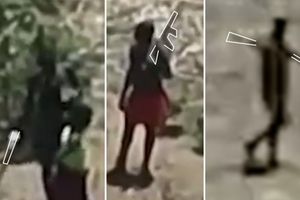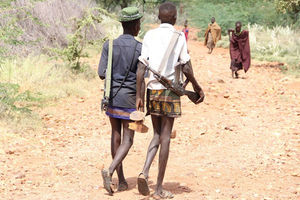
Charles Siwakat, 34, a reformed bandit who uses social media to create awareness among the youth on the negative impacts of banditry.
At the tender age of 14, Charles Siwakat found himself entangled in the dangerous web of banditry.
Peer pressure and poverty forced him to wield guns and participate in raids.
From his roots in Riwo village in Kapenguria, Siwakat walked a dangerous path towards a destiny of violence and certain death, until his life took a turn for the better and he transformed from a bandit to a peace crusader.
As the firstborn in a family of nine siblings, his responsibilities were immense; he was tasked with herding the family's livestock after failing at school.

Reformed bandit, Charles Siwakat aka Toremo, shaves a client at his Toremo barbershop in Kisumu Ndogo, Maweni in Nyali Constituency.
Ever the truant, he would often disappear for days on end, seeking refuge in manyattas where food was more assured. Eventually, he and five other boys were trained to use firearms and recruited into banditry.
Recalling his first raid in Turkana, he narrated how he and his gang, after receiving blessings from local elders, made away with over 400 heads of cattle.
Motivated by their success, they conducted multiple raids in Turkana, Mount Elgon, and Baringo, amassing over 2,000 cows in just a month of deadly attacks.
But their luck ran out and a fellow gang member was shot dead by a police officer during a raid in Trans Nzoia County.
The loss, however, didn't deter the remaining members, and they continued to launch raids.
In 2005, their audacity led them to attack a village in Uganda, resulting in two members being killed by police officers from the Anti-Stock Theft Unit.
“I survived with a gunshot wound on my left leg, earning me the nickname 'Toremo'. I was left unconscious in the bush and was rescued by locals who helped him cross the border and hid him from the authorities,” he told Nation. This marked the turning point for Siwakat.
Convinced by his cousin to abandon banditry, he relocated to Mombasa after three months of contemplation.
“There, I enrolled in a driving school and later secured employment as a security guard. The decision to reform brought joy to my family, especially my mother, who had repeatedly urged me to quit banditry. Today, I am an advocate for peace, using social media to reform other youths engaged in banditry,” he told Nation in an interview.
Sikawat established the Toremo Foundation, which focuses on anti-banditry campaigns, educating children from poor families, and donating books to schools in West Pokot County.

Reformed bandit, Charles Siwakat aka Toremo, at his Toremo barbershop in Kisumu Ndogo, Maweni in Nyali Constituency.
The reformed bandit has advocated for the improvement of infrastructure in schools in banditry prone areas as well as school feeding programmes to increase retention and transition rates.
Siwakat is also engaged in outreach programmes, encouraging the youth to surrender their illegal firearms to the government in exchange for amnesty.
This comes amid an intensive security operation launched by the government last year to combat banditry in Samburu County.
The initiative was prompted by sustained attacks that led to the killing of dozens of people.
However, despite the government's concerted efforts to quell the violence, the Kenya Kwanza administration has experienced a mixed bag of fortunes.
Following the revival of the National Police Reserve (NPR) in December 2022, over 600 new police reservists have been recruited.
The national government has also invested in community-based intelligence gathering and modern personal protection equipment for police officers.
The NPRs, being natives of the region, have played a crucial role as a quick response force to counter cattle rustlers, collaborating closely with local police officers in areas such as Pura, Longewan, Lkeek Sabuki, and the volatile border between Samburu and Baringo.
The government has also deployed the Special Operations Group of the Kenya Defence Forces to banditry zones.
Interior Cabinet Secretary Kithure Kindiki, despite reports of rampant attacks, insists Operation Maliza Uhalifu is successful.
“Security agencies have made significant strides towards the suppression of banditry activities in the North Rift region” he said, adding: “Banditry in most of Samburu County has been contained, with huge success registered in Baragoi, a notorious hotbed of crime.”
Prof Kindiki underscored the government's commitment to sustaining Operation Maliza Uhalifu for the complete eradication of banditry in the north.









